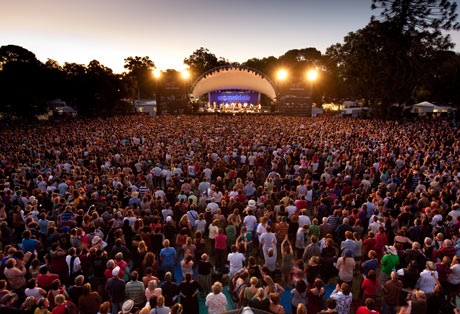The first WOMAD (World Of Music, Arts & Dance) festival in Adelaide was in 1992. It was a time before large-scale music festivals, and even before the term ‘world music’ meant much to anyone, “The notion of world music didn’t really exist, it had only just started as a liner in the CD racks as a category,” says WOMADelaide Director, Ian Scobie.
The first WOMAD (World Of Music, Arts & Dance) festival in Adelaide was in 1992. It was a time before large-scale music festivals, and even before the term ‘world music’ meant much to anyone, “The notion of world music didn’t really exist, it had only just started as a liner in the CD racks as a category,” says WOMADelaide Director, Ian Scobie.
Eight years later, music festivals abound but WOMADelaide remains one of a kind. “Our partnership with WOMAD has been terrific because it works both ways in terms of informing each other of artists that we come across in our travels and the way that the festival has evolved and worked.” In addition to an eclectic mix of the world’s musicians the program now presents performing and visual artists. The most recent addition to the offering (in 2004) is Taste the World, serving up delectable morsels of dishes from all over the world.
Presented over four days in Adelaide’s beautiful Botanic Park, WOMADelaide now has a passionate and loyal following, “Our audiences often have more missionary zeal for what they think the event should be about than we do,” shares Scobie. “Our view is to try and present a really diverse range of creative practice from around the world, the road less travelled I guess, so audiences can have that discovery.”
The arts program over the years has presented dance, sound installation and theatre to a broad audience who perhaps have never seen those kinds of works. “You take it out of the context of the gallery space, where it might ordinarily be seen. I think that’s the key to the success of the event: the concert hall is all very well for a certain audience, they know the rules – they know when to applaud; they know when to be quiet; they know when the movement is finished. While that’s comforting for that audience, it’s quite forbidding to an audience who isn’t familiar with it so they just don’t go.”
Bringing together thousands of people can be a logistical and security nightmare, but that hasn’t been the WOMADelaide experience. “We are blessed with a beautiful park – it’s a beautiful space to be in and that’s an important key element. It’s like anything to do with social behaviour, I think – if you put on an event on in a barren place, surrounded by chain link fence and lots of security guards, then people will respond generally in a fairly iffy social way. Whereas if you provide a beautiful environment and a sense of understanding about recycling and how rubbish is handled then you won’t generally have the issues you’d have at an event with 25,000 people at it.”
The largest spectacle (the performance space covers a hectare) this year is French ensemble Le Phun’s Les Gûmes, a play on the French word for vegetable, legumes. Le Phun share Scobie’s aim to present theatre in a different way. “Performance art is often about almost punching the audience in the face to make them respond or come out of their normal sense of distance, to make them engage. Whereas Le Phun have a different approach: they’re witty, whimsical – I mean they’re French after all,” says Scobie. “The idea of it is that audiences in relatively small numbers engage with one or two performers at a time.” As audiences wander through the installation, stopping at discreet performance spaces, they meet various plants who reflect on their experiences, and in turn, the human condition. It’s a world where plants speak. “One of them is a character who is a tree,” explains Scobie. Particularly moved by his story, the tree cries and through some tricky plumbing, the audience standing under his limbs are given an impromptu shower. “It’s kind of witty, it’s a bit of a piss take, but it’s also quite sad and contemplative,” says Scobie.
If crying plants aren’t your thing, there’s plenty more to entertain: Tawdry Heartburn’s Manic Cures sees Australian James Berlyn’s beautician-cum-confidant extract anonymous secrets from audients, whilst visual installation Tjukurpa Mulapa Tjukaritja – Sacred Stories from Australia brings together dreaming story pieces by artists from the APY (Anangu Pitjantjatjara Yankunytjatjara) lands, in the far north of South Australia.
On your travels chances are you’ll come across Compagnie Ekart’s gigantic puppet creations, Maurice and Jules and Hector and his friend the anthropologist. We won’t ruin the surprise, but there are monkeys and roosters involved.
Then of course, there’s the WOMADelaide music program, which you should check out online. Is it too late to change your Christmas list? Tickets to WOMADelaide are looking mighty attractive.
WOMADelaide happens in our little sibling city of the South, Adelaide, at Botanic Park from March 11 ‘til March 14. It features Angus And Julia Stone, Afro Celt Sound System, Amadou And Mariam, Joanna Newsom, Luka Bloom, Space Invadas, Nitin Sawhney, Don Letts, DJ Norman Jay, Asa, Imelda May, Juan De Marcos Afro-Cuban All Stars, Ash Grunwald, The Necks and more – and that’s just music. In arts, you’ll experience Le Phun’s Les Gumes , Leigh Warren and Frances Rings’ Breathe with didgeridoo player William Barton and much, more more. For tickets and more info, go to womadelaide.com.au.

